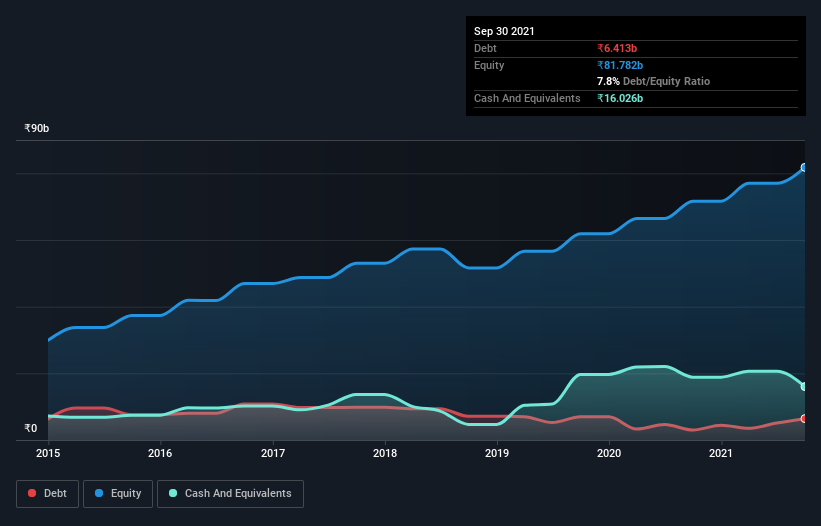
Warren Buffett famously said, 'Volatility is far from synonymous with risk.' So it might be obvious that you need to consider debt, when you think about how risky any given stock is, because too much debt can sink a company. We note that Dabur India Limited (NSE:DABUR) does have debt on its balance sheet. But is this debt a concern to shareholders?
Why Does Debt Bring Risk?
Debt and other liabilities become risky for a business when it cannot easily fulfill those obligations, either with free cash flow or by raising capital at an attractive price. In the worst case scenario, a company can go bankrupt if it cannot pay its creditors. However, a more frequent (but still costly) occurrence is where a company must issue shares at bargain-basement prices, permanently diluting shareholders, just to shore up its balance sheet. Of course, debt can be an important tool in businesses, particularly capital heavy businesses. The first step when considering a company's debt levels is to consider its cash and debt together.
View our latest analysis for Dabur India
How Much Debt Does Dabur India Carry?
You can click the graphic below for the historical numbers, but it shows that as of September 2021 Dabur India had ₹6.41b of debt, an increase on ₹3.00b, over one year. However, it does have ₹16.0b in cash offsetting this, leading to net cash of ₹9.61b.

How Healthy Is Dabur India's Balance Sheet?
We can see from the most recent balance sheet that Dabur India had liabilities of ₹32.5b falling due within a year, and liabilities of ₹2.33b due beyond that. On the other hand, it had cash of ₹16.0b and ₹7.24b worth of receivables due within a year. So it has liabilities totalling ₹11.5b more than its cash and near-term receivables, combined.
This state of affairs indicates that Dabur India's balance sheet looks quite solid, as its total liabilities are just about equal to its liquid assets. So while it's hard to imagine that the ₹1.08t company is struggling for cash, we still think it's worth monitoring its balance sheet. Despite its noteworthy liabilities, Dabur India boasts net cash, so it's fair to say it does not have a heavy debt load!
Another good sign is that Dabur India has been able to increase its EBIT by 21% in twelve months, making it easier to pay down debt. When analysing debt levels, the balance sheet is the obvious place to start. But ultimately the future profitability of the business will decide if Dabur India can strengthen its balance sheet over time. So if you're focused on the future you can check out this free report showing analyst profit forecasts.
Finally, while the tax-man may adore accounting profits, lenders only accept cold hard cash. While Dabur India has net cash on its balance sheet, it's still worth taking a look at its ability to convert earnings before interest and tax (EBIT) to free cash flow, to help us understand how quickly it is building (or eroding) that cash balance. During the last three years, Dabur India generated free cash flow amounting to a very robust 82% of its EBIT, more than we'd expect. That puts it in a very strong position to pay down debt.
Summing up
We could understand if investors are concerned about Dabur India's liabilities, but we can be reassured by the fact it has has net cash of ₹9.61b. And it impressed us with free cash flow of ₹14b, being 82% of its EBIT. So is Dabur India's debt a risk? It doesn't seem so to us. When analysing debt levels, the balance sheet is the obvious place to start. But ultimately, every company can contain risks that exist outside of the balance sheet. For instance, we've identified 2 warning signs for Dabur India that you should be aware of.
When all is said and done, sometimes its easier to focus on companies that don't even need debt. Readers can access a list of growth stocks with zero net debt 100% free, right now.
New: Manage All Your Stock Portfolios in One Place
We've created the ultimate portfolio companion for stock investors, and it's free.
• Connect an unlimited number of Portfolios and see your total in one currency
• Be alerted to new Warning Signs or Risks via email or mobile
• Track the Fair Value of your stocks
This article by Simply Wall St is general in nature. We provide commentary based on historical data and analyst forecasts only using an unbiased methodology and our articles are not intended to be financial advice. It does not constitute a recommendation to buy or sell any stock, and does not take account of your objectives, or your financial situation. We aim to bring you long-term focused analysis driven by fundamental data. Note that our analysis may not factor in the latest price-sensitive company announcements or qualitative material. Simply Wall St has no position in any stocks mentioned.
Have feedback on this article? Concerned about the content? Get in touch with us directly. Alternatively, email editorial-team (at) simplywallst.com.
About NSEI:DABUR
Excellent balance sheet average dividend payer.

